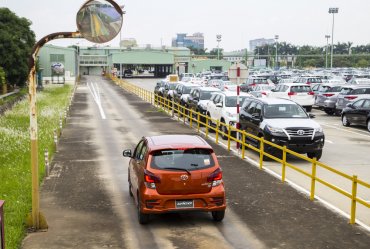Vietnams declining automotive sales may hinder lubricant market growth. To stay competitive, patience to develop a reliable lubricant distribution network is key, said an official from Vilube in Singapore.
The car market shrunk and is still in a declining trend due to excise taxes and non-tariff barriers, said Keith Schulz, general director of Vilube – a subsidiary of High-Tech Lubricants AP Pte Ltd. – at a pre-conference seminar June 26 before the ICIS Base Oils and Lubricants Conference in Singapore. High-Tech Lubricants is French lubricant company MOTULs distributor for Asia-Pacific.

Photo: Ovu0ng/Shutterstock
A Toyota Wigo takes a test drive in Hanoi, Vietnam. Automotive sales have declined in Vietnam, potentially affecting lubrication market growth in the country.
Since the implementation of the Association of Southeast Asian Nations free trade zone with zero import tariffs for products originating from Asian countries this year, Vietnams automotive market has declined.
In June, motor vehicle sales fell 5 percent to21,913 units, compared to the previous month. Sales of passenger cars were down 1 percent, commercial vehicles dropped 8 percent and special-purpose vehicles slumped 42 percent, according to the Vietnam Automobile Manufacturers Association.
A decree introduced in Vietnam this year has strict regulations for imported cars, such as providing a sample from each imported batch of cars for a tear-down inspection. Only Thailand was able to meet this requirement, he said.
Profitability is reduced, and though it may be a temporary measure, turmoil is the right word for the situation, he added.
Foreign lubricant blenders, not including original equipment manufacturers that produce genuine oil, have the largest market share. BP Castrol leads the market with 25.8 percent, followed by Shell at 11.6 percent and JXTG Holdings and Chevron with 9.6 percent share each. Among local blenders, Petrolimex has a 9 percent share, while Mekong Lube has 4.8 percent and Nikko 1.9 percent.
The top five [automotive] brands are Toyota, Hyundai, Mazda, Ford and Kia. Pickups have also become a trend like in Thailand. The Ford Ranger leads this segment, Schulz said. With about 1.4 million cars currently on Vietnamese roads, 33 percent are under warranty, while the remainder have expired warranties.
Building a reliable aftermarket distribution network in Vietnam requires patience. Vietnam has many small distributors who do not have the ability to scale. To overcome the challenge of scalability, you have to have a value proposition and understand their web of relationships, said Schulz.
If you dont know them, then you dont know where your lubricants end up, he added. Align with the right channel partners across the whole supply chain and have a clearly sustainable path to profitability.
Like many countries in Southeast Asia, lubricant education workshops for technicians play a major role in the type of oil and brand consumers use. Technicians were not intentionally selling low-cost lubricants, but the gap in knowledge between lubricant companies and technicians [is there], Schulz explained.
Car owners have little oil knowledge, and distributors with technical expertise are rare, he added.
Vilube educates its distributors. We forced the distributors to go with us on a workshop level on general maintenance, car operations and repairs. Standards are far below [those in] other countries, and distributors felt that they were being pulled away from their sales calls, he shared.
But we are now gradually seeing that there is a change in semi-synthetic and fully-synthetic products, he continued. The company leverages Vilubes infrastructure and distribution network, and scales up training to differentiate itself in the market.
Schulz also suggested collaborating with spare parts and tire shops, as lubricant blenders do in Malaysia. This can give lubricant brands a better presence.
There are opportunities for brands in the long-run, but a high degree of patience, focus and a clear brand identity is needed, he concluded.
High-Tech Lubricants AP acquired Vilube, a Vietnamese blender, in 2008. Vilubes lubricant plant is located in Hiep Phuoc Industrial Park in Ho Chi Minh Citys Nha Be District and has capacity of 35,000 kiloliters (31 million metric tons) per year.